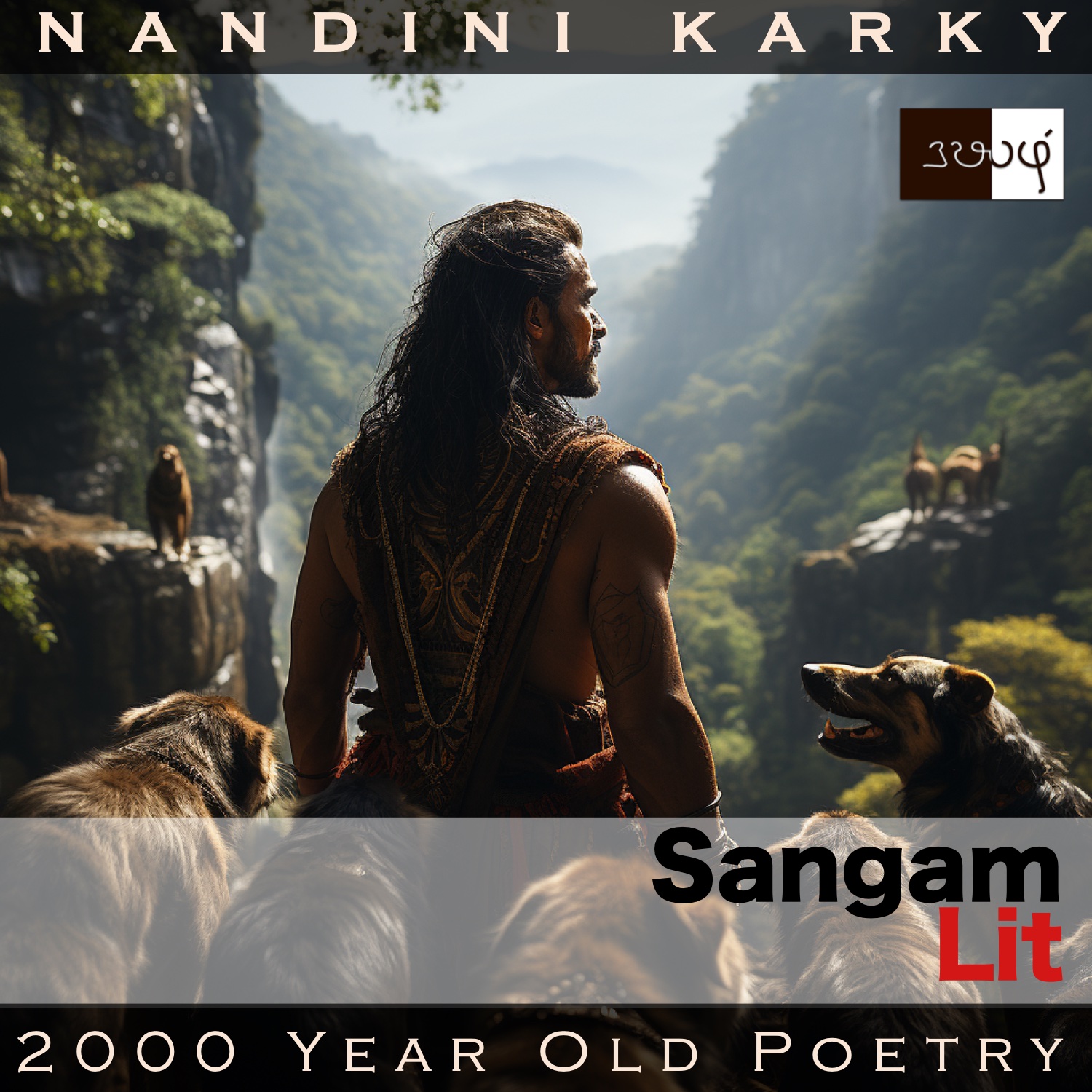Podcast: Play in new window | Download
Subscribe: Apple Podcasts | Spotify | Amazon Music | Android | iHeartRadio | TuneIn | RSS | More
In this episode, we learn of the good name earned by a king of a minor region, as portrayed in Sangam Literary work, Puranaanooru 205, penned about the Velir King Kadiya Neduvettuvan by the poet Perunthalai Saathanaar. Set in the category of ‘Paadan Thinai’ or ‘Praise’, the verse defines the nature of this king’s generosity.

முற்றிய திருவின் மூவர் ஆயினும்,
பெட்பின்று ஈதல் யாம் வேண்டலமே;
விறல் சினம் தணிந்த விரை பரிப் புரவி
உறுவர் செல் சார்வு ஆகி, செறுவர்
தாள் உளம் தபுத்த வாள் மிகு தானை,
வெள் வீ வேலிக் கோடைப் பொருந!
சிறியவும் பெரியவும் புழை கெட விலங்கிய
மான் கணம் தொலைச்சிய கடு விசைக் கத நாய்,
நோன் சிலை வேட்டுவ! நோய் இலையாகுக!
ஆர் கலி யாணர்த் தரீஇய, கால் வீழ்த்து,
கடல்வயின் குழீஇய அண்ணல் அம் கொண்மூ
நீர் இன்று பெயராவாங்கு, தேரொடு
ஒளிறு மருப்பு ஏந்திய செம்மல்
களிறு இன்று பெயரல, பரிசிலர் கடும்பே.
A song extolling a king’s nature in giving to those who come seeking to him. The poet’s words can be translated as follows:
“Even if it’s from the three great rulers with vast wealth, we do not want charity, if it’s without care. To those whose battle rage has ceased and who come riding to you on speedy horses, you become the refuge. On the other hand, to those enemies who come determined to war with you, you respond with an army of swords, O lord of Kodai hills, fenced by white flowers.
Ruining narrow and wide forest paths, scattering deer herds, pounce your fierce and speedy dogs, O hunter with a sturdy bow! May you live a life without affliction! So as to pour down thundering rains of prosperity, pulled by the winds, estimable clouds that assemble around the seas, part not from there without gathering water. Likewise, it’s known that even relatives of supplicants who come to you part not without striking chariots and imposing elephants with radiant tusks!”
Let’s take a closer look at these words. The poet starts not by mentioning this king but the three great rulers of ancient Tamil land – the Chera, Chozha and Pandya kings. These rulers were the emperors of this region with immense wealth and resources at their disposal. Even though so rich they may be, we poets will never accept what they give if they do so, without care and concern for us, the poet explains. After that introduction about how they value not just what is given but how it’s given, the poet moves on to describe this king, who was the ruler of the Kodai hills. Someone who had the nature of becoming the refuge for repentant kings, who realise that they cannot win in a battle with him, and at the same time, to those enemies who fail to grasp this truth, he replies to them with a strong army of swords, the poet illustrates.
The poet describes how this king, as suited to his name of ‘Vettuvan’ or ‘hunter’ can be seen running along with a strong bow, along with his pouncing hunting dogs, chasing deer in the narrow and wide paths of those mountains. He then talks about the fact how clouds when they decide to rove over the seas, will never part from there, without collecting moisture from down below for they have the duty of pouring rains that bring fertility to a land. The poet concludes by placing this nature of the clouds in parallel with that of supplicants who come to this king’s court, saying it’s a well-known fact that they would never part without gaining from this king, chariots and elephants many. With that, the poet takes an immutable law of nature, that of the relationship dynamics between the clouds and the seas, and uses that to sketch the fame of this king’s immense generosity. In that contrast between the charity of the three great rulers mentioned in the beginning of this verse and that of this king of a modest region in the Kodai hills, sketched in the end, we understand that it’s not how much wealth one has nor the position in life one holds, but rather how one relates to those around them that will end up determining the legacy they leave behind!




Share your thoughts...